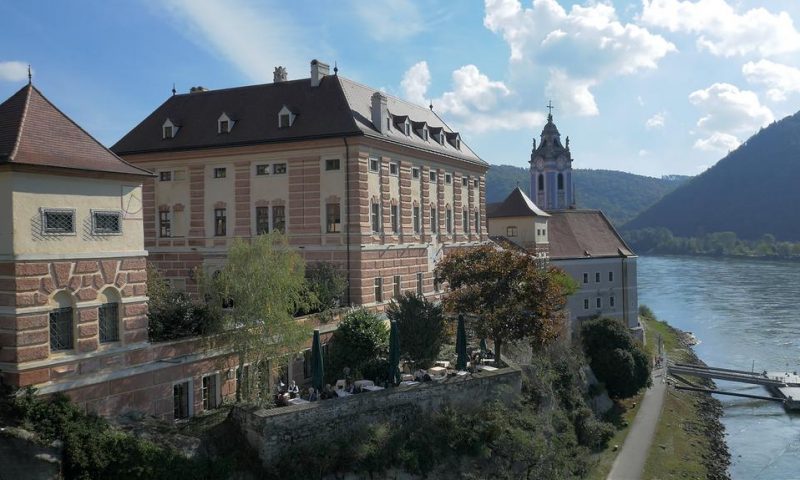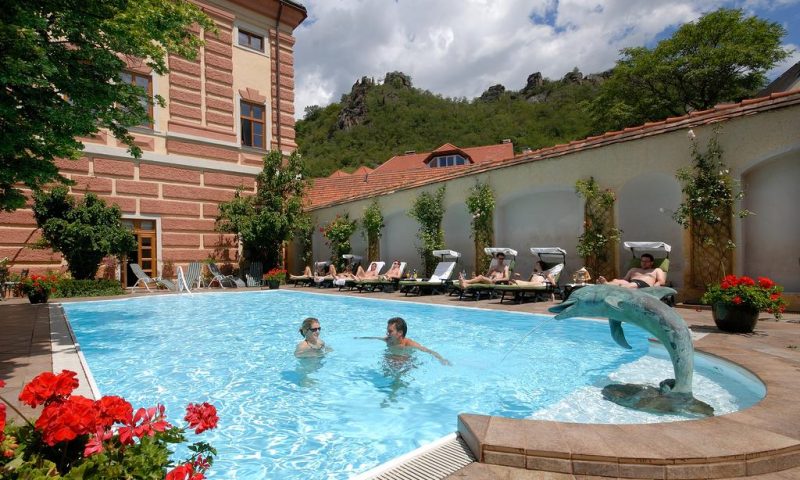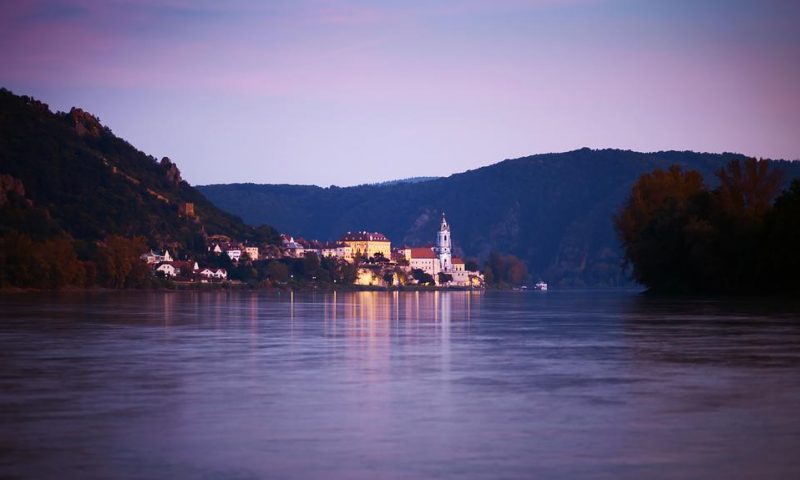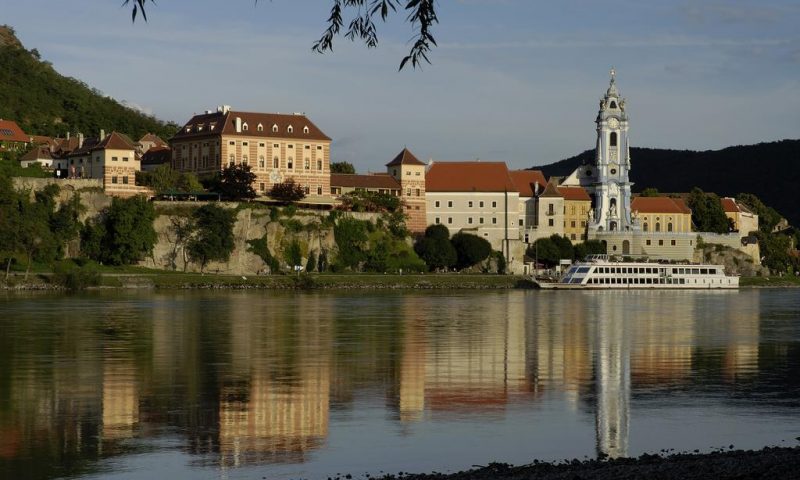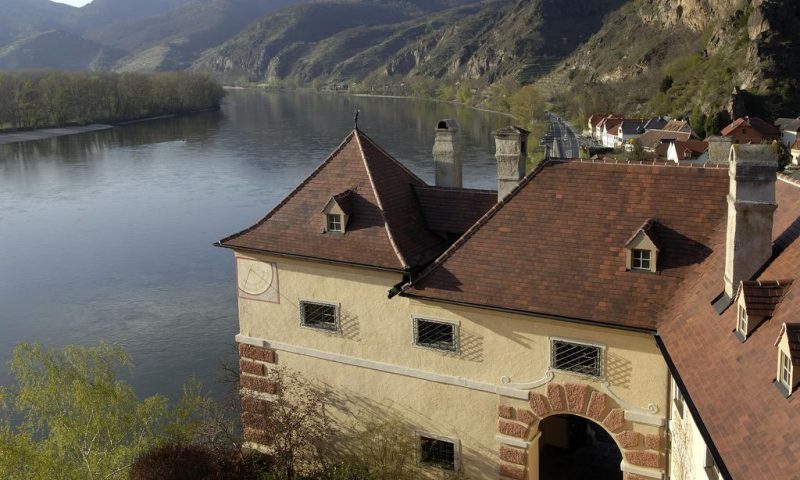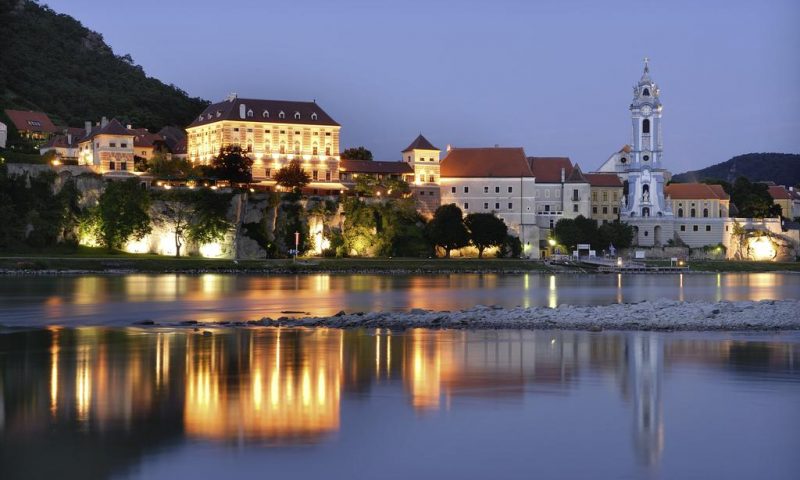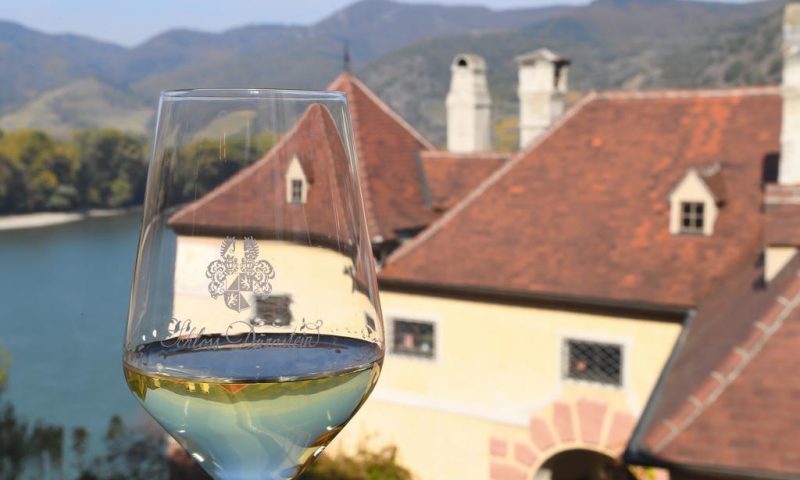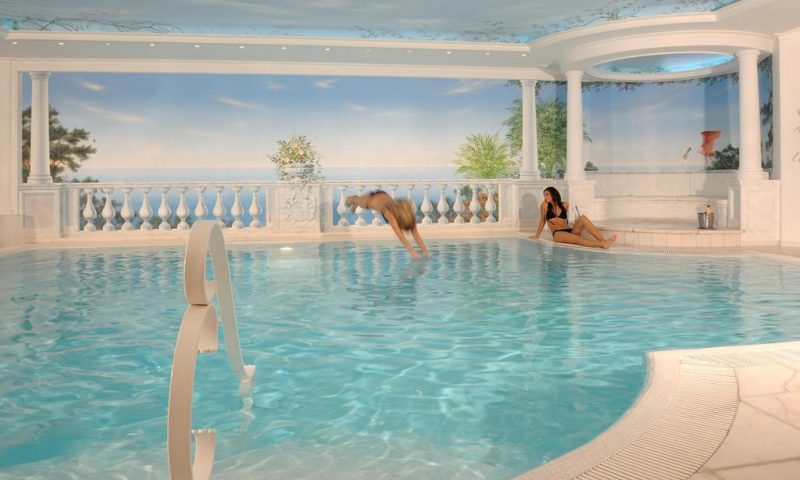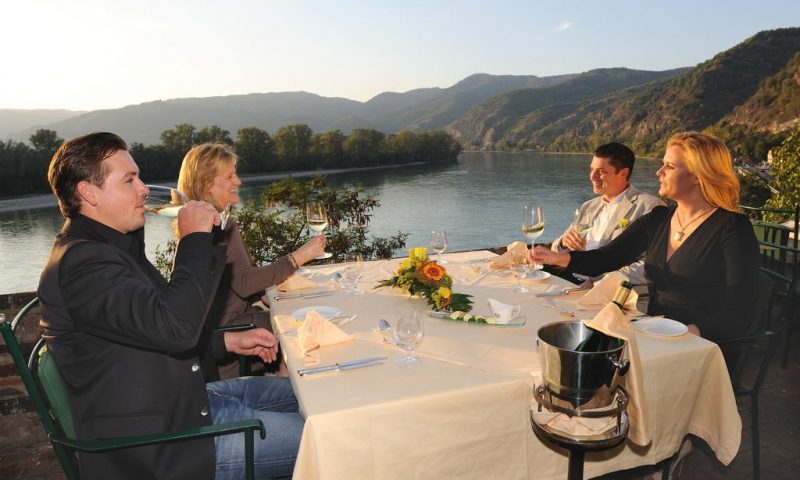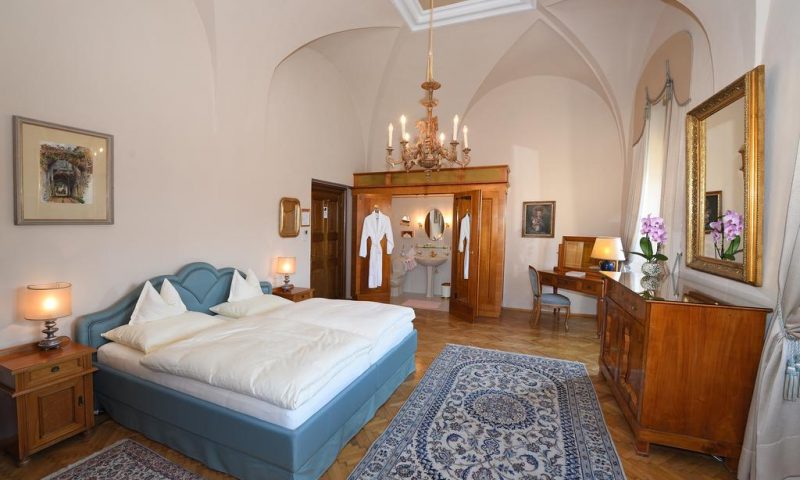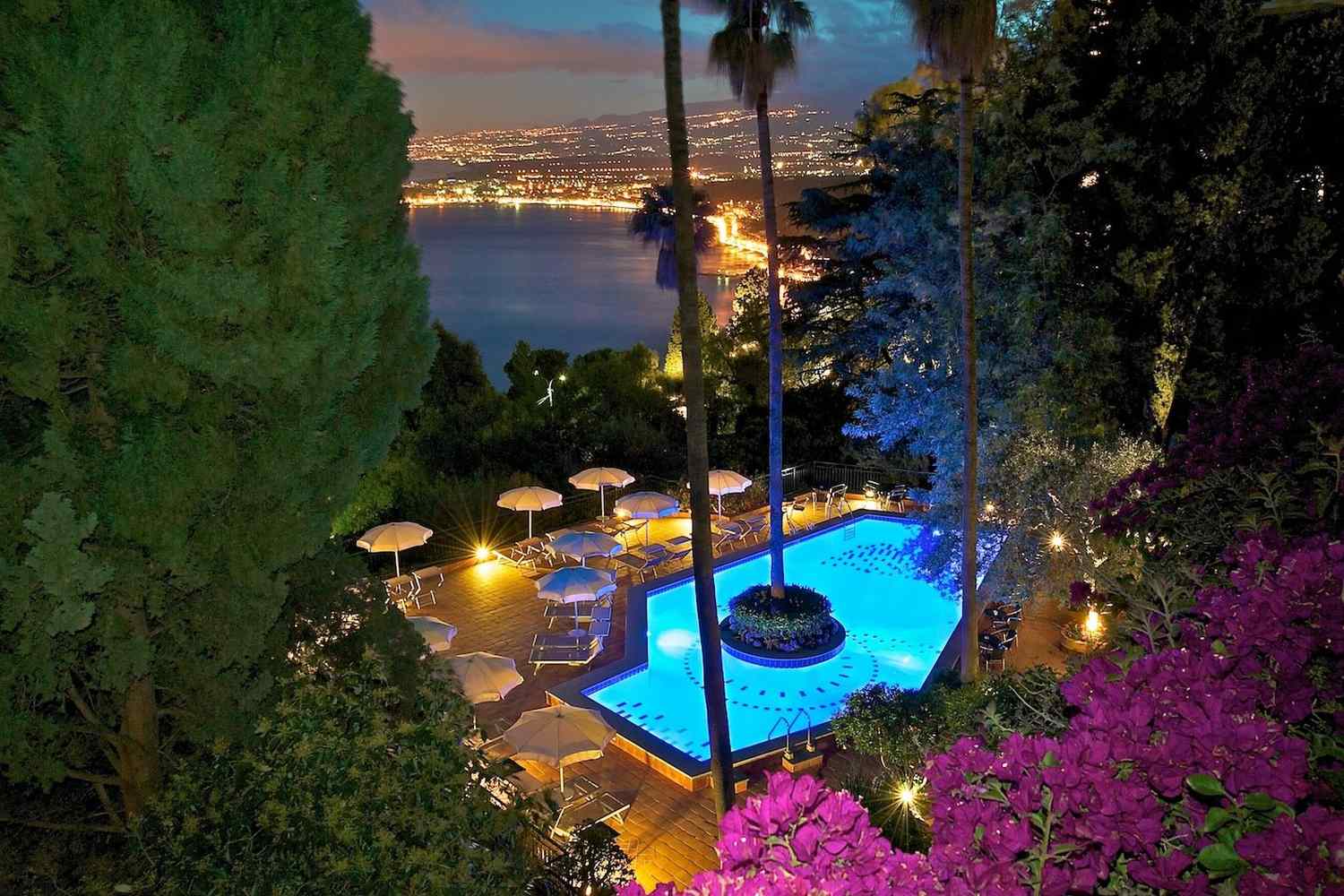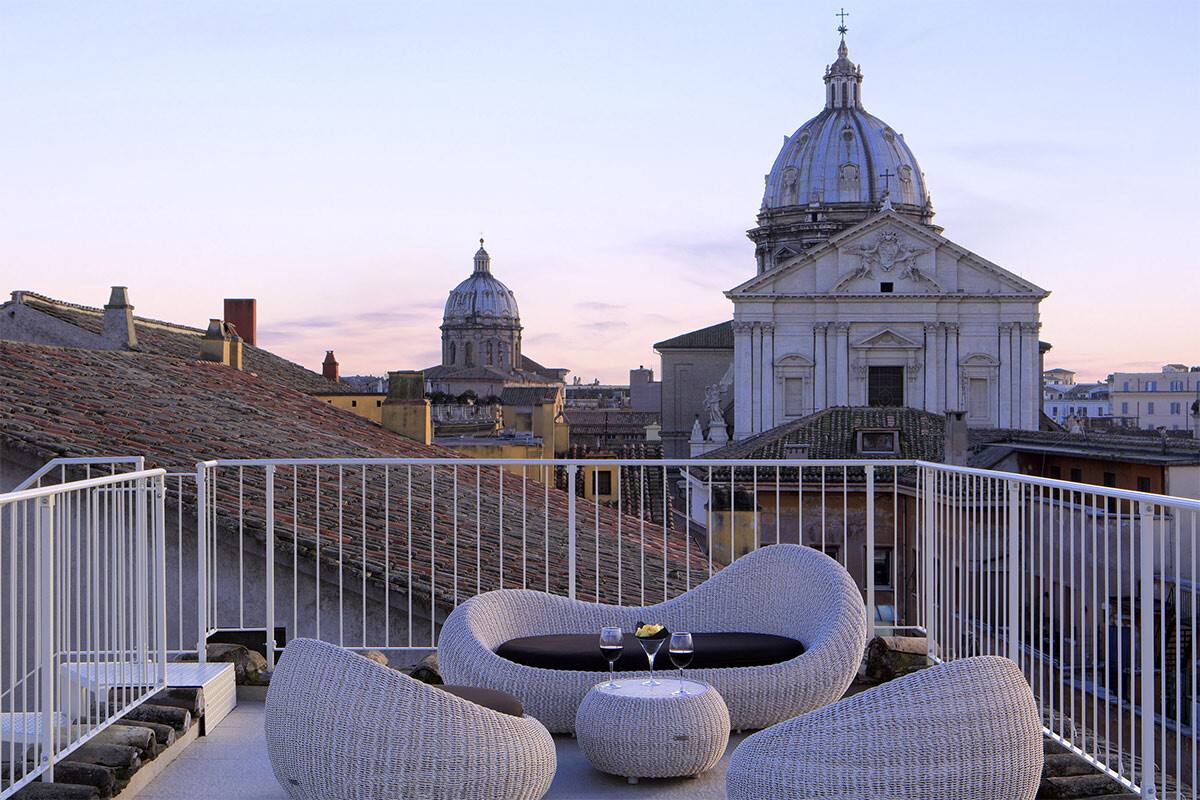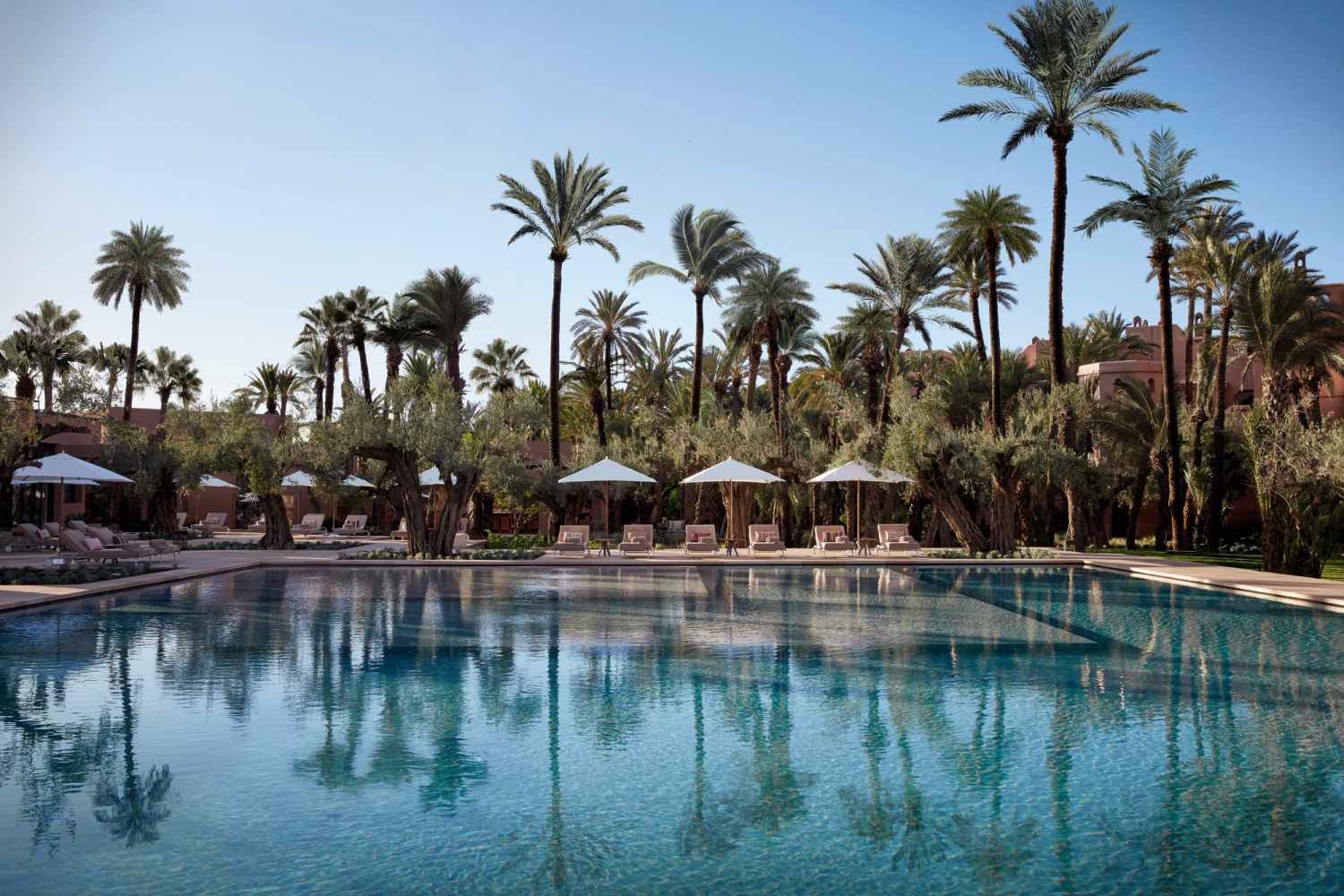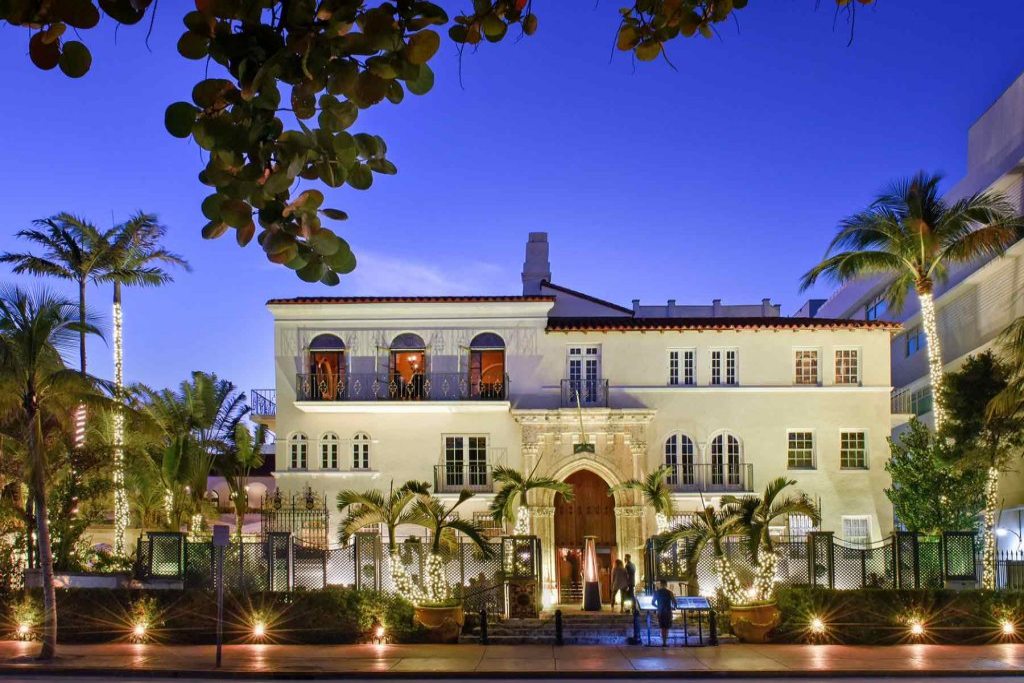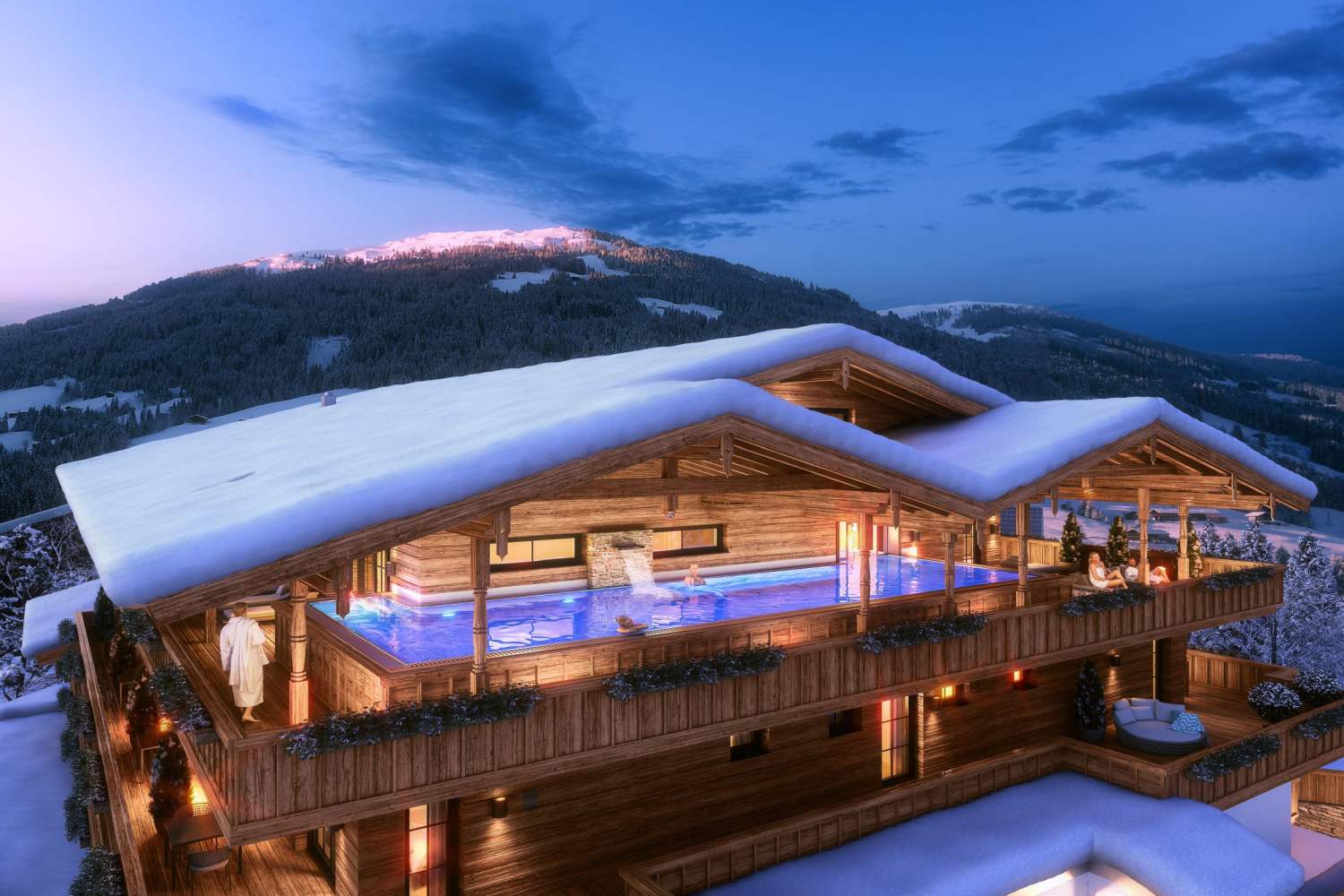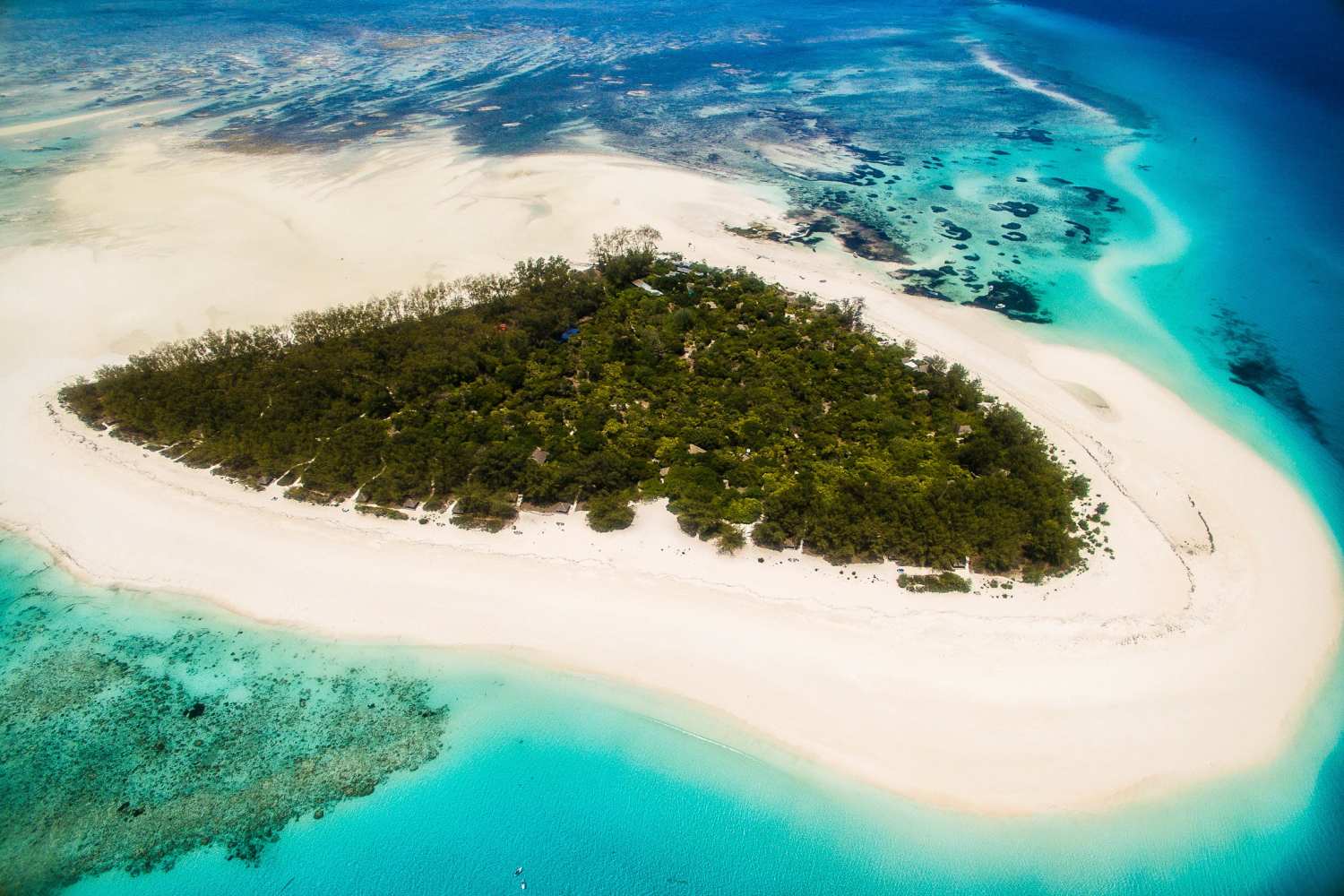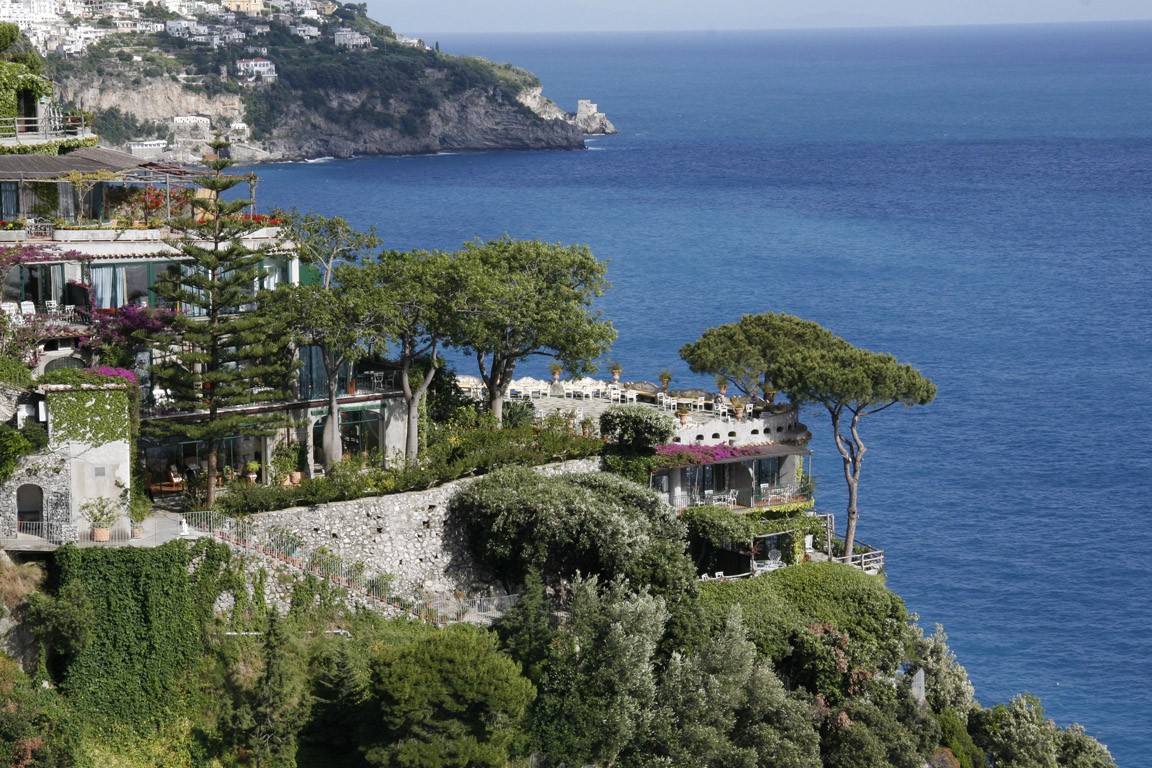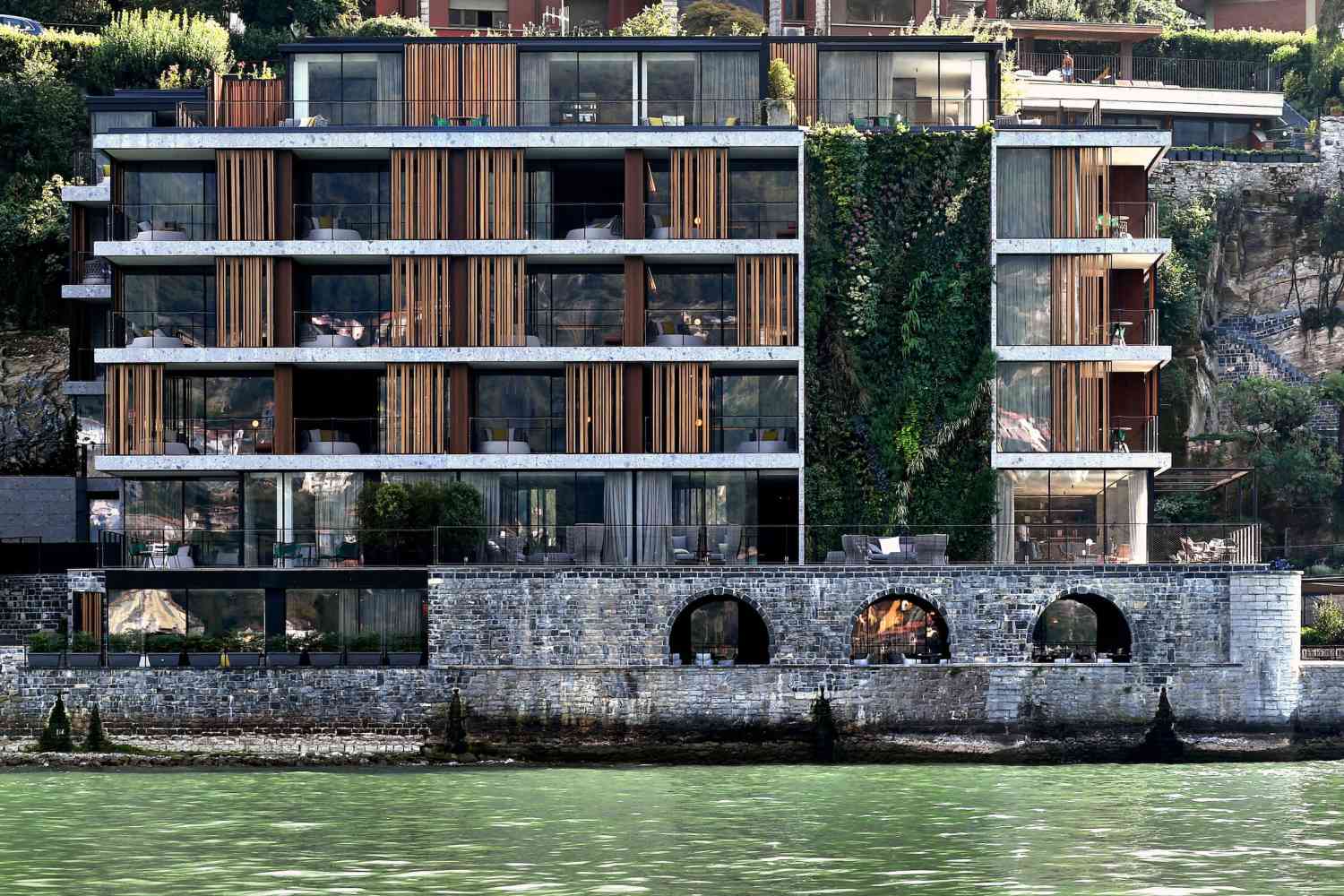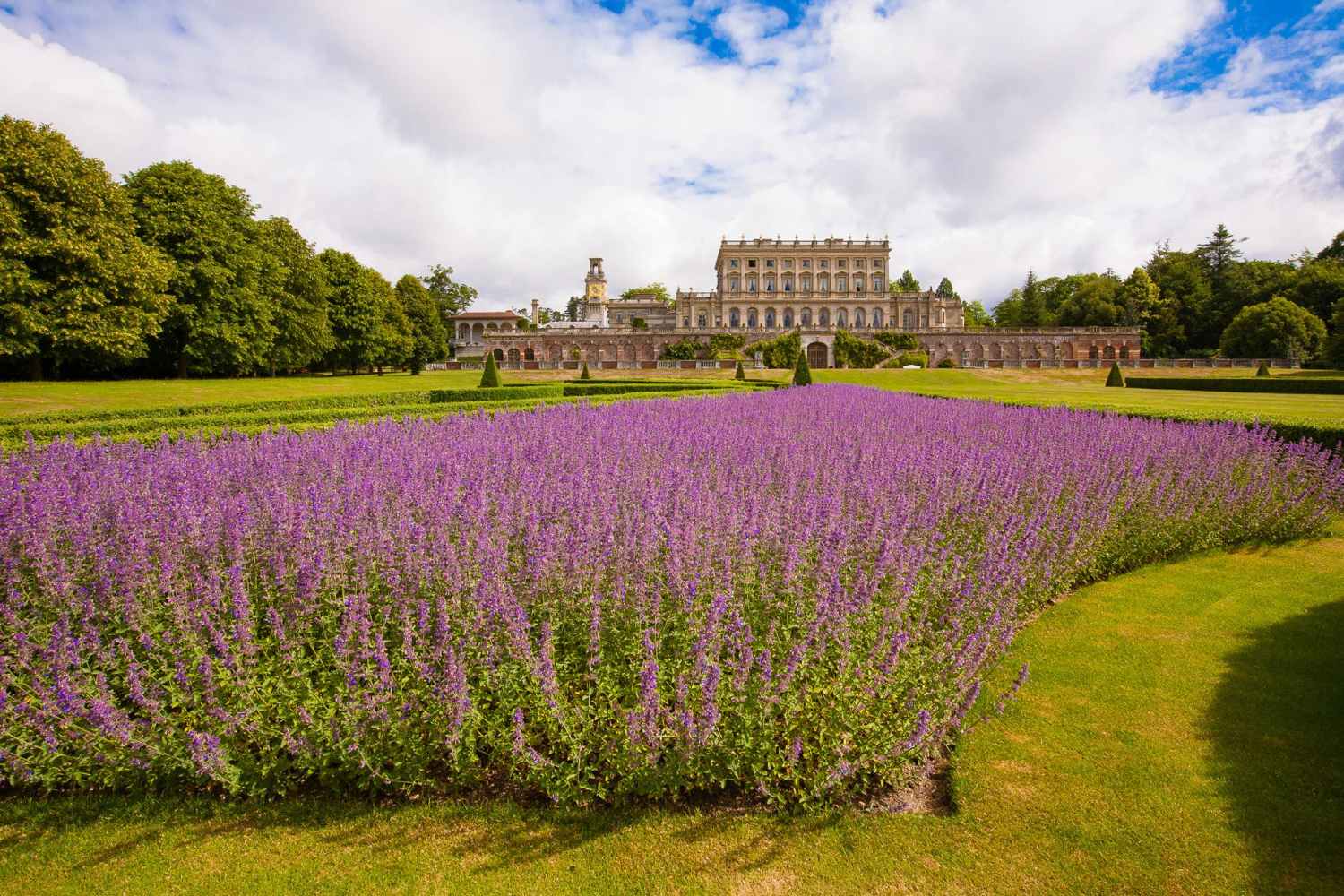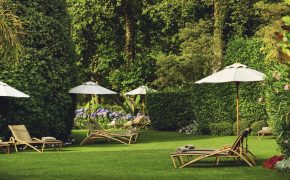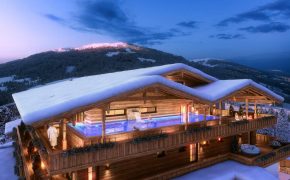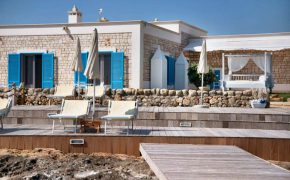In a magnificent position in the Wachau, the gorge which is the most picturesque section of the Danube, where Nature and Art combine in perfect harmony, stands Dürnstein Castle, amidst the World Heritage Site.
Built in Renaissance style, it was for centuries the property of the Princes Starhemberg. In recent centuries the present owners have converted it into a hotel of great style catering for even the most fastidious guest.
The Wachau enjoys a mild, dry climate, which means not only that Austria’s most renowned white wines grow here, but also that the restaurant terrace is a perfect place for just sitting and enjoying – indeed, it has deservedly acquired the reputation of being the most beautiful terrace on the whole length of the Danube.
The fine cuisine of head chef Hans Zusser and the splendidly stocked cellar have made in this castle hotel a meeting-place for gourmets.
History of the castle
ZELKINGER
The “New Castle” was built from 1622 to 1630 by Christoph Wilhelm from the art-loving family of the barons of Zelking at the place where the Maissauer Hof and houses of wine-makers used to stand.
The architect was probably Cipriano Biasino based in Krems, who also built the Krems parish church. By marriage, the property fell into the hands of Heinrich von Zinzendorf and Pottendorf in 1634.
ZINZENDORFER
The counts of Zinzendorf and Pottendorf were an ancient Lower Austrian noble family, which, like most of the nobility in Lower Austria, converted to Protestantism. In the course of the Counter-Reformation a lot these families left their old homeland and also the Zinzendorfs found a new home in Dresden.
A grandson, Nikolaus Ludwig, became the founder of the “Herrenhuter Gesellschaft”, which still operates worldwide today. In 1663 they sold the castle to Conrad Balthasar, Count of Starhemberg.
STARHEMBERG
In contrast to the previous owners, the castle was not the residence of the Starhembergs, but was occasionally used only during visits to the winery and during hunts.
Outstanding event was the September 1683, when Emperor Leopold I, who lay with a small flotilla at Dürnstein and lived in the castle, received the news of the liberation of Vienna from the Turks. In 1937, Ernst Rüdiger von Starhemberg sold the castle to the Thiery family.
Family
The senior bosses Rosemarie and Johann Thiery have managed with much dedication and love to open the only 5 star hotel in Lower Austria from an old building in a desolate state. Although they have long been able to afford to enjoy life without work to its’ fullest, both are on duty daily and still look after the guests.
The grown-up children and managing directors Maria Katharina Thiery-Schroll and Johannes Christian Thiery grew up in the hotel and fell in love for their own business in the cradle.
Historical
WACHAU
The earliest historical mention of the place called “Wachova” occurred in 823 AD. “Wachova” originally referred to the town now known as Spitz, and by the 12th Century, “Tal Wachau” (Valley of Wachau) began to mean the region from the town of St. Michael to Watstein, a road bottleneck that lies west of Dürnstein.
The region we now know as Wachau, the Danube valley between the settlements of Melk and Krems, first began being used somewhat later on during the Era of Romanticism.
TOWN DÜRNSTEIN
The small town of Dürnstein was built along a narrow strip of land between a steep mountain and the Danube, serving as an important port for ships and regional stronghold throughout its history. In 1019, Emperor Henry II gave this strategic location to the Tegernsee Abbey.
The nearby municipality of Unterloiben had belonged to the abbey since 1002, while Oberloiben was under Salzburg’s control. After 1050, various towns in Lower Austria were heartily dedicated to growing, supporting, and defending themselves alongside Saxon ministerials from the Kuenring family.
Even nowadays, this era lives on through local sayings and history. The Kuenrings remained true to their foundations: the Cistercian Zwettl Abbey (1137) and the Dürnstein town charter originated with them.
On September 1, 1347, Dürnstein became designated as a city for the first time in an official Kuenring inheritance document. On April 26, 1476, Emperor Fredrick III gave Dürnstein its municipal coat of arms. The town’s 650-year anniversary was celebrated with great joy in 1997.
ABBEY DÜRNSTEIN
During conversion of the nunnery to the manor of the Chorherren-Stift in the Baroque period and the splendid reconstruction of the latter, the ensemble Dürnstein essentially got today’s famous look.
RUIN DÜRNSTIEN
Burgruine Dürnstein was originally built in 1130 by Hadmar I of Kuenring and was destroyed in 1645 during the Thirty Years’ War by Swedish forces; however, the castle was already uninhabitable for some time prior to being demolished. During 1192-1193, Richard I of England, also known as Richard the Lionheart, was imprisoned here.
Swimming Pool Areas
Our swimming pool areas are open daily for hotel guests between 7.00 and 20.00. Sauna, steam bath, infrared cabin and a fitness room are part of this spa area, which you can use as a hotel guest. Of course we provide towels free of charge. Quench your thirst with the provided soft drinks and tea from our tea bar!
DAY SPA
Occasionally it is possible to use our spa area, even if you are not a hotel guest. In this case, please contact our receptionist by phone!
€ 30,00 Day Spa entrance per person including towels, bathrobe, slippers, access to sauna, steam bath, infrared cabin and fitness room. Furthermore, you can choose from the minibar and enjoy tea from the tea bar.
Thai Yoga
Traditional Thai Yoga bodywork based on the Ayurvedic Medicine Energy:
Everything living is nourished and controlled by the life force (Prana). When this prana flows naturally and harmoniously, body, mind and feelings are in harmony.
The energy channels, which are embedded like streams and rivers in the landscape of the body, must be open and free. However, if the prana stagnates, the traditional Thai yoga bodywork practitioner can get it flowing again by stimulating and encouraging finger pressure.
The treatment takes place in comfortable clothing on a treatment mat. The therapist stretches, mobilizes and relaxes the entire body using body weight with fingers, palms, elbows, knees and feet.
AFTERNOON TEA
With our Afternoon Tea Arrangement, guests who do not spend the night in the hotel have the opportunity to use our beautiful terrace for coffee in the afternoon.
Between 14:00 and 15:00 you will enjoy: Our “Afternoon Tea Package” costs € 25,00 per person and includes sweet and salty snacks, as well as coffee/tea as you wish; also a glass of sparkling wine.
Winter Garden & Terrace
One of the most beautiful places along the Danube River. If you want to experience the beauty of the Wachau, our terrace is just the right place for you. Here, the Danube turns boldly into a curve and the view from above is the box seat for this magical spectacle.
Enjoy a delicious dinner on the Danube terrace, accompanied by the best wines of the region, let your day pass and tastefully end. Our newly built winter garden offers protection against rain and cold in the transitional period and provides shade in the hot summer weeks.
Wine Cellar and Wine Tastings
Between Thursday and Saturday we invite you to a wine tasting in our cellar at 6.15 pm. You will get an insight into the wine world of the region while tasting 6 wines. The price per person is € 28,00. Hotel Guests pay a special rate of € 20,00 only.
In addition, you are welcome to visit the cellar with the head waiter or sommelier and choose a bottle of your choice. Certainly you can buy all of the listed wines for your home.
Festivities
Our restaurant is open to hotel guests and other guests alike. There is no day off during the entire season, which runs from late March to late October . If you want to eat à la carte, this is possible up to a maximum of 10 guests.
If you are between 11 and 20 people, you can spontaneously enjoy a suggested menu from our cook. Otherwise, we ask you for timely reservation, so we can make you a menu proposal; In addition, we provide our premises for a private party or company dinner.
Grill Restaurant
Our second restaurant is a two-minute walk from Dürnstein Castle. You enter this beautiful garden area over a small wooden gate and then descend the stairs to the pond.
From here on you dive into the world of our grill tavern called “Küffer Keller”! Get to know and appreciate the garden landscape with its pond and lounge pavilion, as well as the wine cellar inside!
Lobby, Bar & Library
Not only are our house swallows are comfortable in the lobby as they spend their spare time here watching the reception area’s happenings, but also our guests as they devote their days to enjoying themselves in the lobby, bar, and library with time at their disposal.
A good glass of Wachau wine accompanying an animated discussion or a thrilling book, together with some lovely background music from our pianist, will help every ounce of your body thoroughly relax.
Villa Schönthal
In may 2016 we finished renovations at this beautiful house in Dürnstein, not far from the Hotel Schloss Dürnstein.
Book your private idyll amidst the village of Dürnstein – a rarely experienced privacy – without renouncing 5-star hotel comfort. The whole Villa will be yours for the time of your stay including a parking space nearby.
Küffer Keller
The Küffer Keller – our Grill Restaurant – is a beautiful garden oasis in Dürnstein not far from the Danube Path at the west entrance with stunning views of the Danube. The area covers three levels and is just perfect for a little break from everyday life.
Lounge pavilion, pond and lawn are just as part of the restaurant as the delightful little tables right next to it. If the weather does not permit sitting outside, enjoy the wine cellar with its open fireplace and its own wine shop.
The Küffer Keller is open between the end of April until the beginning of October from Thursday till Monday. In addition, you can rent this area exclusively for a private party.
Meetings & Conferences
Utmost discretion and professionalism while organizing and hosting meetings, seminars, presentations, and conferences are prioritized at Hotel Schloss Dürnstein. Our fully-adapted meeting room on the top floor seats up to 30 people comfortably. The room is also equipped with appropriate technology for your event.
Wachau – World Heritage
In the year 2000, the cultural landscape Wachau was added to the UNESCO World Cultural and Natural Heritage list together with the Abbeys Melk and Göttweig and the old town of Krems.
The Wachau is a river landscape with a length of slightly more than 30 km between Krems an der Donau and Melk and is the breakthrough valley of the Danube through the Bohemian Massif. It lays adjacent to the Austrian granite and gneiss highlands.
The highest elevations are the Jauerling (960 m) and Sandl (723 m). The Wachau lies on the border of two Lower Austrian regional landscapes, to the south the Mostviertel and to the north the Waldviertel. The Donauseitental and the Spitzer Graben also belong to the Wachau.
WINE
The Wachau wines are known worldwide for their excellent quality. The tradition of winegrowing has its’ early origins at the time of the Roman settlement of the Wachau and experienced a first heyday under the rule of the Carolingians.
In the Middle Ages, the Wachau wines were well known far beyond the borders of Austria. If you have an affinity with wine, the Wachau offers many opportunities to pursue your interests.
But not only the Wachau wines are worth a tasting; The nearby regions Kremstal, Kamptal and Traisental are also part of every wine tour in Lower Austria.
APRICOT
The Chinese already knew the apricot around 3000-2000 BC. The route of propagation in Western Europe may have been via Italy, Spain and France, while the Danube countries, according to recent research, received the apricot via the Pontus and the Donauweg.
The oldest evidence to date for the term apricot “Maryln” in the Danube region can be found in a letter collection from the Starhemberg Archives in Eferding near Linz (Letter of July 23, 1509).
In the capitulary of Charlemagne, who names all the fruits of culture at that time, there is no specific mention of the apricot, since it was counted as a peach from the 3rd until the 16th century. From the French “abricot” the name “Aprikose” spread to Western and Northern Germany, where it is still used today.
In southern Germany, Switzerland and Austria the name “Marille”, which probably stems from the Italian “armellino” established itself. This originated again from the Latin “armeniaca”, meaning originating from Armenia. From the terms “Amarellen”, “Morellen”the word “Marille” was formed.
HEURIGER
In Austria, the word “Heuriger” can be used to reference both a young wine or the locality where this wine is served. This “Heuriger” can both be a so-called “Buschenschank”, the seasonally limited serving of wine by its’ producers, or a restaurant operated as a “Heuriger” year-round.
The authorisation for winemakers to legally sell their own wines in their homes without an explicit license can be traced back to a law issued by Emperor Joseph II. in the year 1784. Historically, this tradition enabled winemakers to present their wines and federweisser each year to the local population.
KREMS
is the fifth largest city in Lower Austria with 23,947 inhabitants. The oldest town privileges date from 1305 and are a snapshot of the impressive development of the medieval town of Krems, from the first settlement to the princely city with special rights. Since then, the twin towns of Krems-Stein have been growing steadily, with trade and viticulture forming the basis for a dynamic development.
The farms, churches and town houses were built and designed by the best builders in the country, many artists and artisans moved to the prosperous Danube city since the Middle Ages.
Education was a key concern of the merchant community, they successfully sought to provide a solid education to their sons and daughters, and soon thereafter opened up access to university education.
Krems has remained a thriving economic, cultural, educational and university city in the 21st Century, and is further a European wine city in Kremstal at the gate to the Wachau.
Krems also enjoys international recognition in the area of monument preservation and revitalization, most recently with the inclusion of the old towns of Krems and Stein as part of the Wachau in the list of World Heritage Sites by the UNESCO.
MUSIC & THEATER
The nearby Grafenegg Castle hosts concerts all year round; a highlight is the music festival in summer, where some of the world’s best orchestras come to perform.
From the Baroque days in Melk, the opera festival in Gars, Shakespeare in the Rosenburg, operettas in Haindorf Castle, summer games in Melk , a series of cultural events will take place throughout the season. The proximity to Vienna makes it possible to visit the opera and the theater from Dürnstein.
EXHIBITIONS & MUSEUMS
The Schallaburg close to Melk is one of the most important exhibition venues in Austria. Every year a new area is presented, the topics reach from the “Treasures of Peru” to “Imperial China” to the “1. World War II”.
Krems offers a wide range of venues with the Weinstadtmuseum, the Gozzoburg, the Kunsthalle and the Cartoon Museum . Weissenkirchen houses the Wachaumuseum in the Teisenhoferhof and Spitz has a very interesting Maritime Museum .
A Roman museum is in Mautern (formerly Favianis – St. Severin) and in Artstetten near Maria Taferl in the castle of the murdered heir to the throne Franz Ferdinand the history of this Habsburg is depicted.
There is a Masonic order museum in Rosenau , a clock museum in Karlstein, a Sundial exhibition in Weiten and the “Heldenberg” – the Austrian “Walhalla” (grave of Field Marshal Count Radetzky).
The famous baroque monasteries Melk and Göttweig are located at the entrance and exit of the Wachau, the castle ruins Aggstein and Dürnstein are known in legend and history, the medieval old towns of Krems and Stein bear testimony to former wealth.
All in all the Dürnstein ensemble is the pearl of the Wachau. In the Waldviertel, the monasteries Zwettl, Altenburg, Geras and the magnificent Rosenburg await visitors.
CYCLING
The soothing flow of the Danube River, the scent of flowering fruit trees, birdsong coming down from the trees and you step forcefully on the pedals. It can be so wonderful. The Wachau decelerates and grounds you, and you will see how wonderfully relaxed you come back after a bike ride.
We provide our guests free mountain bikes , which you only have to call the reception for. In addition, we now have two e-bikes that you can rent for a half or full day for a fee. (€ 20,00 up to 4 h, € 30,00 over 4 h)
WATER
Experience the Wachau from a different angle. Travelling on the water opens new worlds. Especially the canoe and SUP boards are ideal ways to discover them.
Learn the fastest growing sport in the world, Stand Up Paddling SUP for short, in the middle of the Wachau cultural landscape, or enjoy the unique surroundings by canoe. The latest equipment and trained staff are waiting for you in the small Danube Bay in Oberloiben, just a few minutes walk from the hotel.
HIKING
Many hiking trails are just waiting to be accessed by you. Walk through the orchards on the south bank or climb one of the many viewpoints. Even experienced hikers will get all they wish for with the World Heritage route.
CLIMBING
For climbers, the climbing garden in Dürnstein is a good learning and practice area. At the east end of the village, after the city gate, an alley leads left into the trench.
In the first left turn (bank) a small path goes directly to the Däumling, which is the highest and perhaps most rewarding tower in the moat. In addition to the overhanging endurance climbing, there also are some wonderful, easier tours in the O wall.
GOLF
More than 40 golf clubs are available in Lower Austria alone, including five within less than 40 km of us. Most clubs in the region offer hotel guests special green fee reductions.
SEGWAY
In the middle of the Wachau, Segway-Wachau offers the enterprising guest a new forward-looking way of getting around.
BOAT RIDE
The ferry Dürnstein, as a company steeped in tradition has committed itself to the use of “Zillen” with historical paint. For the transfer over the Danube in Dürnstein, “Zillen” have been in use for centuries.
Today motorized Spiegelzillen are in operation for the ferry traffic and for touristic trips. Over the last few years, guests have come to appreciate a trip with the Zille more and more.
Currently, these can not only be used as means of transport, such as to a restaurant or wine tavern, but also to spend some nice hours floating on the river with snacks and wine directly on the Zille.
